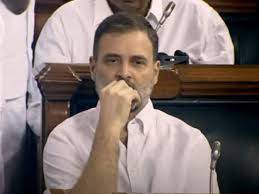In a startling revelation, the Bharatiya Janata Party (BJP) has levelled a serious allegation against the Indian National Congress, claiming that the latter is actively seeking to divide the nation with the assistance of Beijing. The accusation has further heightened the already intense political tensions between the two major parties in India.
The BJP’s assertion stems from a perceived pattern of behaviour exhibited by certain Congress leaders, which they believe indicates a covert collaboration with China. Citing instances of statements made by these leaders that allegedly align with China’s interests, the BJP contends that there is a concerted effort to undermine national unity and stability.
Critics argue that the BJP’s accusations are politically motivated, designed to weaken the Congress party’s influence and tarnish its reputation. They point out that making such serious claims without concrete evidence could further polarize the country’s political landscape and erode public trust in the democratic process.
The Congress party, on its part, vehemently denies the allegations. Party spokespersons have dismissed the BJP’s claims as baseless and a desperate attempt to divert attention from pressing issues such as the economic slowdown, unemployment, and social unrest. They accuse the ruling party of resorting to mudslinging tactics rather than addressing the genuine concerns of the citizens.
The timing of these accusations is crucial, given the ongoing geopolitical tensions between India and China. The border dispute in the Ladakh region has strained diplomatic relations between the two nations, leading to a heightened sense of nationalistic fervour in India. The BJP’s allegation against the Congress taps into these emotions, framing the opposition party as a potential collaborator with India’s arch-rival.
Analysts suggest that while there might be some merit to the BJP’s concerns, it is important to exercise caution before drawing any definitive conclusions. Geopolitical dynamics are complex, and attributing motives to political rhetoric can be misleading. Instead of engaging in a blame game, they emphasize the importance of dialogue and constructive debate to address national challenges.
The episode underscores the broader issue of polarized politics in India. The deep-seated animosity between the BJP and the Congress has often overshadowed meaningful policy discussions and hindered the country’s progress. Accusations and counter-accusations have become commonplace, diverting attention from urgent issues that require bipartisan solutions.
As the allegations play out in the public domain, citizens are left to grapple with conflicting narratives. Many feel frustrated by the absence of concrete evidence to substantiate the claims made by either side. The lack of transparency and accountability in political discourse only serves to widen the trust deficit between the government and the people.
In the digital age, where misinformation spreads rapidly through social media, it is imperative for political leaders to exercise restraint and responsibility while making serious allegations. The consequences of baseless accusations can be far-reaching, affecting not only public perception but also diplomatic relations and economic stability.
In conclusion, the accusation made by the BJP against the Congress of collaborating with China to divide India has added another layer of complexity to the already intricate political landscape. While it is crucial to investigate any potential breaches of national interest, it is equally important to ensure that accusations are substantiated by credible evidence. As the nation grapples with these allegations, citizens hope for a return to meaningful policy discussions and collaborative efforts to address the pressing challenges facing India. It is a critical moment for the political leaders of both parties to demonstrate maturity and a commitment to the nation’s unity and progress.












